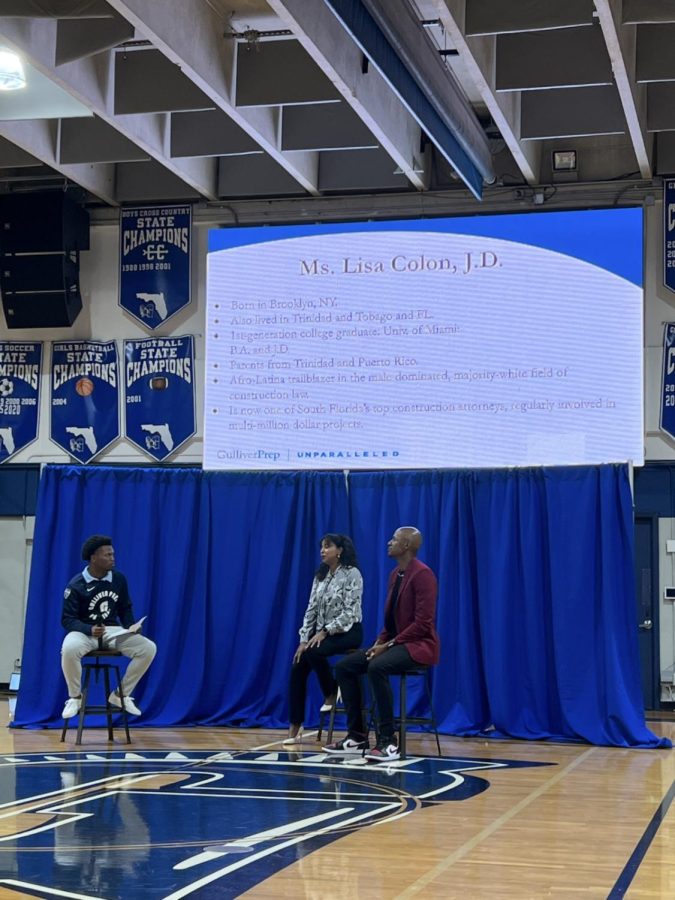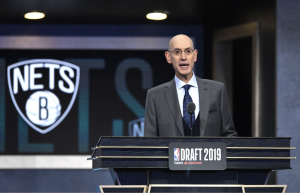Lisa Colon Redefines What it Means to be a Multiracial Woman in Her Field
NBA Hall of Famer Ray Allen and local Attorney Lisa Colon sit down for an interview with senior Jonathan Fyne.
February 27, 2022
Local construction attorney Lisa Colon spoke to the student body Wednesday in the gym during Community Block about the added challenges she has had to face as a female person of color in her field.
Coming from a white male-dominated field, Colon shared that, “I always feel like I have to be better.”
Colon discussed how she faces added pressures and challenges that her white counterparts may not, yet reflected on how she learned valuable lessons from her grandmother that have helped her overcome the adversity she faces within her field.
“My grandmother used to tell me I always had to work harder than my white friends to get anywhere I wanted to go. I never really understood what that meant when I was a kid until I became a lawyer,” said Colon. “I realized that in order for me to achieve what I achieved, I feel like I’ve had to just prove myself more, work harder, do more things to make myself visible.”
Despite having to put in more work and hours into getting where she is today, Colon said that she accepts the obstacles she takes and has made an effort to overcome them with determination.
“Once you’re doing something that you enjoy, it’s okay if you have to work harder. It’s okay if you have to take more hours. Some of us just have to work a little harder. I didn’t get to choose that, so I just live in the moment and do what I need to in order to succeed,” she said.
Even though she’s proud of her Caribbean roots, Colon faces conflict within her own culture. Coming from a Puerto Rican father and Trinidadian mother, Colon feels somewhat alienated at times.
“Sometimes when I say to a Black African American person, ‘I’m Black,’ they look at me like, ‘not really’. You have certain privileges that someone in this country doesn’t. There is tension,” she said.
This hasn’t stopped her from confidently taking her biracial and biethnic elements to define herself as Afrolatina.
“Being Black is not monolithic. There’s not just one thing that divides Black. Black comes from all shades and all colors and all ethnicities,” she stated.
Throughout the presentation, Colon shared valuable lessons with the student body, including lessons that everyone can apply to themselves. For instance, Colon talked about how important it is to step outside of your comfort zone.
“Don’t just go to the places where everyone looks like you or where it’s going to be easy. Choose to do something different,” she said.
Colon also touched on an issue that is currently affecting the Black community: gentrification. By definition, gentrification is the process in which wealthy homeowners and developers move into poor communities, attracting new businesses and improving housing. This process threatens pushing out and displacing poorer residents, whose families often have populated gentrified neighborhoods for generations. As a construction attorney, Colon discussed how she has to keep this issue in mind despite the positive effects of development.
Colon noted that since Miami is a growing city, spaces are at a premium and cheaper lands tend to be in areas where poor communities are found and where many people of color live.
“In Miami there are pockets right now, like Allapattah, where there’s a conversation happening about not pushing out the community there. They did an okay job in Coconut Grove in preserving bohemian Black history and that’s what we really need to do,” she said.
Colon said that in order to prevent further gentrification from harming communities of color, there must be communication between the government, developers, and the community, to develop neighborhoods where all interests are represented.













Erick • Mar 16, 2022 at 1:38 pm
so inspiring!!